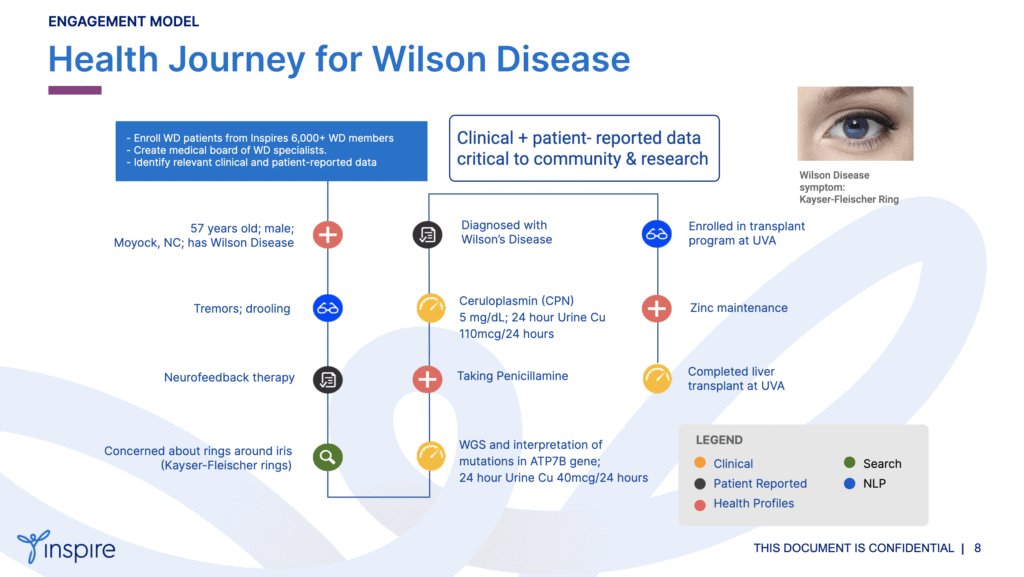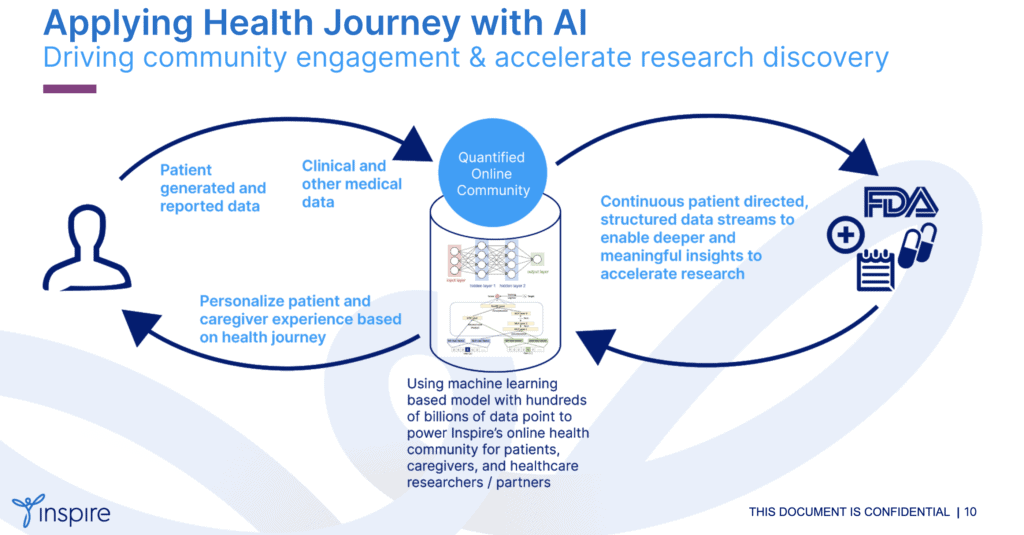[vc_row][vc_column][mpc_textblock content_width=”100″ font_preset=”preset_0″ margin_divider=”true” margin_css=”margin-top:20px;margin-bottom:20px;”]Next Generation Online Health Communities: Data empowering patients and caregivers improves care and accelerates research[/mpc_textblock][vc_row_inner][vc_column_inner][mpc_image image=”12653″ image_size=”large” force_fullwidth=”true” image_opacity=”100″ image_inner_border_gap=”0″ effect=”none” image_hover_opacity=”100″][/vc_column_inner][/vc_row_inner][mpc_textblock content_width=”100″ font_preset=”preset_2″ margin_divider=”true” margin_css=”margin-top:20px;margin-bottom:20px;”]By Richard Tsai
The World Orphan Drug Congress USA 2020 (WODC 2020) provided four days of powerful panels and keynotes about collaborations, successes and failures in creating what rare disease patients and families need and desire most – effective treatments for their conditions.
In one failure turned to success, Kim Stephens shared her story involving inappropriate clinical trial endpoints. Stephen’s son has Hunter Syndrome, an extremely rare inherited condition where children lack an essential enzyme in their cells that eliminates waste . Without that enzyme, waste builds up in cells throughout the body and between the ages of 2 and 4, these children suddenly begin to lose skills they had attained as well as cognitive ability. Children who have this condition die before they become teenagers.1
Stephens’ son was in a clinical trial which provided an enzyme by intrathecal injection. One of the endpoint measures being used for cognitive function was a two hour test. For children with Hunter syndrome, who have attention and focus issues, two hours is an eternity. Parents were seeing significant changes in their children but the endpoint measures were not reflecting those changes. By reviewing online communication with other parents, Stephens noticed an interesting phenomenon, parents of children who were not on the intrathecal treatment described toileting regression while those on the treatment were asking for guidance in teaching or encouraging toileting. Toileting appeared to be a marker they could use to measure cognitive changes. Stephens and another mother created a toileting questionnaire that can be used for just that purpose. Several clinical trials are using it now.1
This story illustrates the tremendous treasure trove of information, ideas and ingenuity that patients and caregivers have and can provide if they are asked. It also illustrates the importance of integrating the patient and caregiver voice into the development of treatments for diseases.
At Inspire, we are building towards a next generation online health community, where members can actively paint their health journeys through the sharing of their medical histories, experiences, outcomes and clinical data.

At the same time, members are also empowered to take control of their holistic data set to be shared with other patients or researchers, thereby advancing medical progress and treatment of disease (in particular for rare diseases!) And over the last few years, we’ve started to see great successes for both patients and researchers.

Value for patients and caregivers
With the advent of artificial intelligence technology and the collective sharing of data and experiences from members, we have been able to transform the community experiences for patients and caregivers. A good example of this is when we developed our personalized content recommendations via machine learning. Click-through rates on emails increased 914% and member retention rates were 550% higher when we followed the members activity for 30 days. One member wrote,
These recommendations are wonderful!!I live in rural Arkansas in a town called Hamburg…We have less than 3000 people and there are hardly any people with stage 3 lung cancer that I know of and I know almost everyone in my beautiful town. These emails are soo good and I was hoping if there is a way to get these emails more frequently? These emails have helped me read and find emotional comfort. Being in a small town, it’s hard to find someone to talk to and I’ve made 4 friends in the last 2 weeks alone who’ve written the posts in the emails and live within 7 miles, so I’m excited to talk to them next week! Please send me more emails if you can. Meanwhile, I’m waiting for the email again next week”.
It’s not often companies receive requests for more emails but at Inspire we want to learn and understand the patient’s perspective to help patients through their health journey.
Value for researchers
In one effort to accelerate research discovery, Inspire is working with Pfizer, the Manton Center for Orphan Disease Research at Boston Children’s Hospital, and Citizen Genetics. The project needed rare patients or survivors affected by lung cancer and/or autoimmune diseases. Specific inclusion and exclusion criteria which included rare sets of phenotypes and a family history of the disease, meant a difficult recruit for this study. Inspire used Natural Language Processing (NLP) and Machine Learning (ML) from both implicit and explicit data sets (i.e. surveys) to identify and recruit over 100 qualified participants within one month. Over 90% of the group that have been recruited are interested in participating in the study, sharing their data, and inviting their family members to participate as well. As part of this observational clinical study, all the participants and their family members will be genetically sequenced to look for potential genetic drivers of their conditions.3
During WODC 2020, we also announced the launch of the Inspire’s Research Accelerator.3 The idea for Inspire’s Research Accelerator grew out of successful research done in partnership with both academic and commercial researchers. For example, dermatologists at Stanford University Medical School asked if patients on Inspire discussed a very specific chemotherapeutic adverse drug reaction that was not on the drug label. Inspire’s data science and research teams examined this together with Dr. Nigam Shah’s team at the Center for Bioinformatics Research at Stanford. This research quickly led to the publication in JAMA Oncology, “Detecting Chemotherapeutic Skin Adverse Reactions in Social Health Networks Using Deep Learning,” discussed here. In a second example, Dr. Farris Timimi, a cardiologist working at the Mayo Clinic, came to Inspire with a question born from observations with patients in his clinic: “Are patients communicating online about statins? Specially, are they communicating about cognitive changes, like memory loss, that they are experiencing?” Inspire’s research team leveraged our online health community and proprietary NLP engine to obtain a resounding yes. The results are published in JMIR. 4 You can see all of our recent publications here.
Research that obtains patients and caregivers opinions about clinical trial design protocols, or that clarify unmet needs of rare disease/rare cancer patients and caregivers ensures that the patient and caregiver voice is integrated into the entire treatment development process. Next generation online communities, like Inspire, make patient and community driven research collaboration a reality.[/mpc_textblock][/vc_column][/vc_row][vc_row css=”.vc_custom_1483606399832{padding-top: 20px !important;padding-bottom: 20px !important;}”][vc_column][vc_row_inner css=”.vc_custom_1496685033252{padding-bottom: 40px !important;}”][vc_column_inner width=”2/3″][mpc_textblock content_width=”100″ font_preset=”preset_2″ margin_divider=”true” margin_css=”margin-top:20px;margin-bottom:20px;”]Download this case study, “Real World Voice Insights: Communicating about Rare Disease”
[/mpc_textblock][mpc_button preset=”preset_1″ block=”true” url=”url:https%3A%2F%2Finspireresearch.com%2Fresource%2Freal-world-voice-insights-communicating-about-rare-disease%2F|title:Real%20World%20Voice%20Insights” font_preset=”preset_1″ font_color=”#ffffff” font_transform=”none” font_align=”center” title=”Download this case study” icon=”fa fa-angle-right” icon_color=”#ffffff” icon_size=”14″ icon_effect=”stay-left” icon_gap=”20″ background_color=”#084a8e” border_css=”border-radius:2px;” padding_divider=”true” padding_css=”padding-top:10px;padding-right:20px;padding-bottom:10px;padding-left:20px;” margin_divider=”true” margin_css=”margin-top:30px;” hover_font_color=”#ffffff” hover_icon_color=”#ffffff” hover_background_color=”#116eba”][/vc_column_inner][vc_column_inner width=”1/3″][mpc_image image=”12623″ image_link=”url:https%3A%2F%2Finspireresearch.com%2Fresource%2Freal-world-voice-insights-communicating-about-rare-disease%2F|title:Real%20World%20Voice%20Insights%3A%20Communicating%20about%20Rare%20Disease” image_size=”large” image_opacity=”100″ image_inner_border_gap=”0″ effect=”none” image_hover_opacity=”100″][/vc_column_inner][vc_column_inner width=”1/3″][/vc_column_inner][/vc_row_inner][flipbook-shelf ids=”humanizing_the_brand_experience, insights_from_engaged_patients, expert_by_experience_2016, expert_by_experience_2015, expert_by_experience_2014, case_studies_using_multimodal_research, case_study_prostate_cancer_consumer_support_group_survey, case_study_sleep_disorders_private_research_community”][mpc_callout layout=”style_8″ title_font_preset=”preset_5″ content_width=”100″ content_font_preset=”preset_2″ icon_disable=”true” background_color=”#e8e8e8″ border_css=”border-width:5px;border-color:#d3d3d3;border-style:solid;” padding_css=”padding:15px;” mpc_button__preset=”preset_1″ mpc_button__block=”true” mpc_button__url=”url:%2Fresources|||” mpc_button__font_preset=”preset_1″ mpc_button__font_color=”#ffffff” mpc_button__font_transform=”none” mpc_button__font_align=”center” mpc_button__title=”Learn More” mpc_button__icon=”fa fa-angle-right” mpc_button__icon_color=”#ffffff” mpc_button__icon_size=”14″ mpc_button__icon_effect=”stay-left” mpc_button__icon_gap=”20″ mpc_button__background_color=”#47aff3″ mpc_button__border_css=”border-radius:2px;” mpc_button__padding_divider=”true” mpc_button__padding_css=”padding-top:10px;padding-right:20px;padding-bottom:10px;padding-left:20px;” mpc_button__margin_divider=”true” mpc_button__margin_css=”margin-top:10px;” mpc_button__hover_font_color=”#ffffff” mpc_button__hover_icon_color=”#ffffff” mpc_button__hover_background_color=”#116eba”]Inspire offers a trusted community to patients and caregivers. Our goal with this blog, this website and our content is to provide the life science industry access to the true, authentic patient voice. In so doing, we support faithful operationalization of patient-centricity. Take a look at our case studies, eBooks and news outlet coverage.[/mpc_callout][/vc_column][/vc_row][vc_row][vc_column][mpc_textblock content_width=”100″]References:
1PANEL: Stronger Together: Continuing industry and patient partnerships to ensure inclusion of patient voice along the full continuum of development, from pre-clinical through commercialization, Monday, August 24, 2020 9:10 AM to 10:00 AM
World Orphan Drug Congress USA 2020,
https://www.terrapinn.com/conference/world-orphan-drug-congress-usa/agenda.stm
2Patient Forward Access to Clinical and Technological Research: Genetic Influences on Lung Cancer and Atopic Dermatitis (PFACTR02) https://clinicaltrials.gov/ct2/show/NCT04362852
3Loew, B. Redefining Rare: Health Journeys for millions of rare disease patients to unlock medical discoveries, Monday, August 24, 2020 12:50 PM to 1:20 PM World Orphan Drug Congress USA 2020 https://www.terrapinn.com/conference/world-orphan-drug-congress-usa/agenda.stm
4 Research publications. Inspire. https://inspireresearch.com/resources/research-publications/
[/mpc_textblock][/vc_column][/vc_row][vc_row][vc_column][vc_column_text]
[/vc_column_text][/vc_column][/vc_row]